The Sino-German Seminar on Criminal Justice was successfully held during 2016 January 11-16 in Freiburg, Germany. At the invitation of Professor Hans-Jörg Albrecht, director of Max Planck Institute for Foreign and International Criminal Law, Professor Haiyan Wang, Professor Ping Wang and Professor Zhuhao Wang from China University of Political Science and Law attended the seminar.
More than 30 scholars and experts attended the seminar, including Professor Hans-Jörg Albrecht, director of Max Planck Institute for Foreign and International Criminal Law, Professor Bjorn Ahl from Institute of East Asian Studies of the University of Cologne, Professor Walter Perron from Institute for Criminal Law and Criminal Procedure at the University of Freiburg, Professor Georg Michael Gesk from Law School at the University of Osnabrück, Professor Silvia Barona Vilar from Faculty of Law at the University of Valencia Spain, Senior Research Fellow Dr. Michael Kilchling form Max Planck Institute, as well as other visiting scholars and institute researchers.
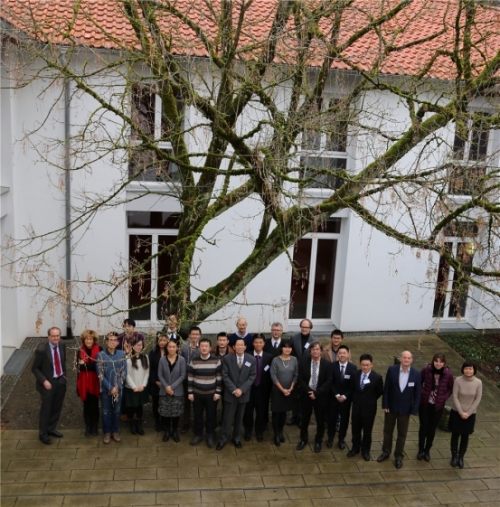
During the speech, Professor Albrecht gave a warm welcome to the Chinese professors as well as other guests and expressed that Max Planck Institute for Foreign and International Criminal Law attaches great importance to the partnership with 2011 Collaborative Innovation Center of Judicial Civilization and China University of Political Science and Law. Moreover, communication and cooperation between Max Planck Institute for Foreign and International Criminal Law and Chinese scholars have been remarkably increasing since the establishment of the CICJC sub center in Germany - “Center for Chinese Legal Studies” at MPI Freiburg.
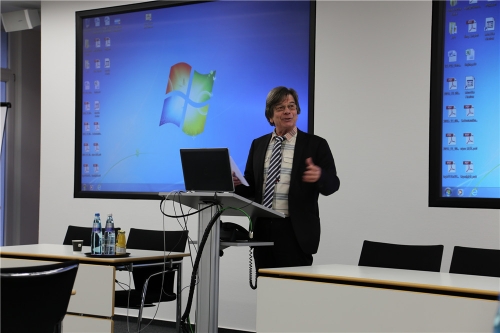
Taking the analysis on the present situation of the witness appearing in court in China as the subject, Professor Haiyan Wang gave a speech which introduced the problems of witness non-appearance in court systematically from the following three aspects: the status quo of witness testifying in court in criminal cases in China, the institutional dilemma of witness non-appearance and the path to solve the problems of witness non-appearance in court. He pointed out that in order to ensure the key witness appearing in court, we shall conduct procedural division, allocate the judicial resources reasonably, set up the conditions of key witness’s appearance in court and the consequences of non-appearance, and improve the protection mechanism as well as the economic compensation system of witness appearing in court.
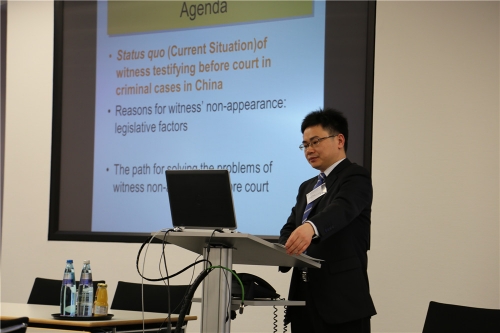
Professor Ping Wang made a thirty-minute English speech on the theme of Practices of Restorative Justice in China. Professor Wang pointed out that China has introduced the restorative judicial procedure for more than ten years and some domestic universities has established some relevant research institutions, which played an important role in the promotion of the research and transmission of the restorative judicial theory. Based on the actual situation of Chinese society, the criminal justice system has the symbolic restorative judicial practice, and there are pilot projects in investigation, prosecution and trial stage. Besides, the 2012 Criminal Procedure Law made special sections and provisions on the victim-defendant adjustment mechanism. In the future, the legislators should establish China’s restorative correction system step by step through the legislation of community correction and the amendments of prison law.
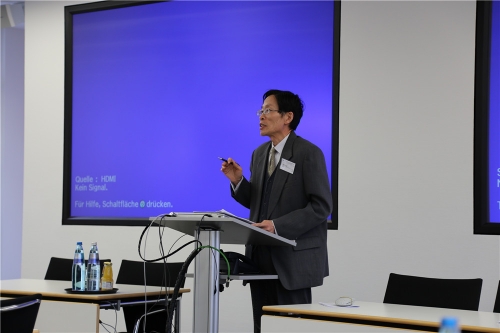
Professor Zhuhao Wang made a thirty-minute English speech on the theme of A Trail to Modernity: Observations on the New Developments of China’s Evidence Legislation Movement in a Global Context. Professor Wang made a comprehensive review of the development of Chinese evidence law since the year of 2000, analyzed the internal and external factors behind the development, and introduced the important project of National Social Science Fund Project, research on the rule of litigation evidence, which is led by Deyong Shen, vice president of China’s Supreme People’s Court. Also, Professor Wang expressed that the development of China’s evidence law is a miniature of China’s modernization of the rule of law.
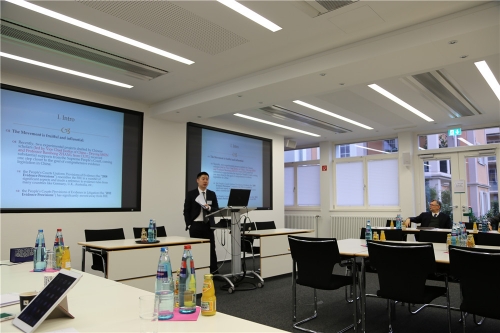
Professor Walter Perron from Institute for Criminal Law and Criminal Procedure at the University of Freiburg, Professor Hans-Jörg Albrecht and Professor Bjorn Ahl from Institute of East Asian Studies of the University of Cologne made wonderful comments on the three Chinese professors’ speeches respectively. The atmosphere of the seminar was very lively, and many guests expressed their understandings and opinions, and asked meaningful questions which was answered patiently by the Chinese delegation.
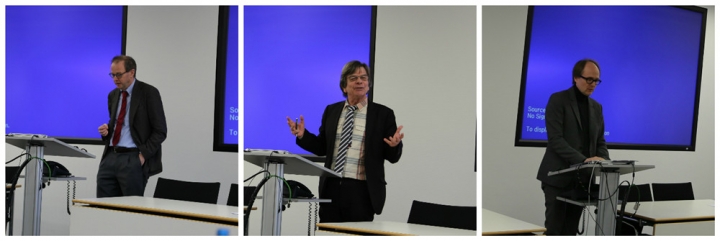
On the afternoon of January 12, the delegation of Collaborative Innovation Center of Judicial Civilization visited the library of Max Planck Institute for Foreign and International Criminal Law, accompanied by Head of MPI Freiburg library, Ms. Elisabeth Martin. Also, they visited the German sub center of CICJC, and paid a visit to Dr. Lin Jing, a senior researcher of Max Planck Institute, also a researcher at the Center for Chinese Legal Studies.
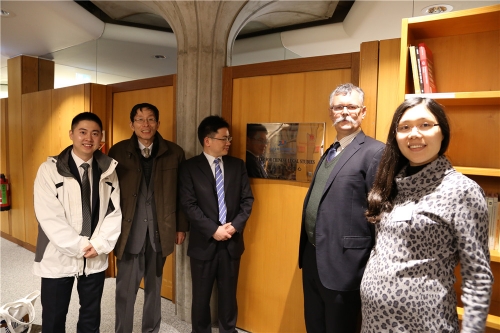
On January 14, the Chinese delegation attended the trial in Freiburg District Court with Professor Dr. Johanna Rinceanu from University of Freiburg law school, also a senior researcher of Max Planck Institute. The delegation was deeply impressed by the layout of the district court in Germany, the arrangement of the trial proceedings, the professional skills of the judge including their leading role in trial, process control skill and the control of the result and their discretion, all witnesses appearing in court and being inquired by the judge, also the confrontation by both sides. Professor Rinceanu also made explanations for the delegation in detail.
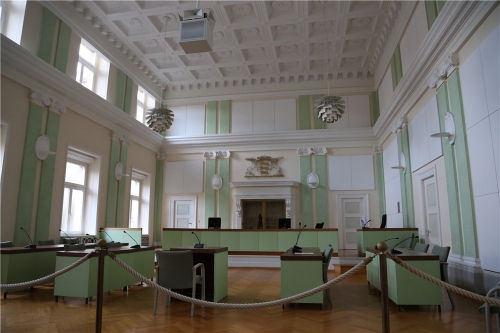
On the morning of January 15, the delegation visited Freiburg prison for serious crimes. The warden, Mr. Ruder, introduced details about the prison, including the configuration of the prison, its function division, different types of criminals and the arrangement of their daily life, relatives visiting, laboring, and studying and so on. It was impressive that the facilities in prison are sound, the management operation is scientific and reasonable and their assurance of the basic survival environment for the prisoners is perfect.
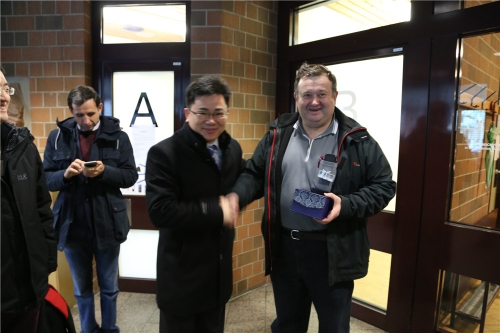
On the afternoon of January 15th, the delegation visited the Procuratorate of Baden-Wurttemberg State and was warmly welcomed by the State Chief Procurator, Mr. Dieter Inhofe. A two-hour symposium was held between the two parties, during which the chief procurator introduced the system settings of their procuratorate, basic operating process, material data statistics and the key problems in routine work. Additionally, the procurator took great patience to answer the questions asked by the delegates. Also, the delegation introduced the basic situation of China’s judicial system and judicial reform to the procurator.
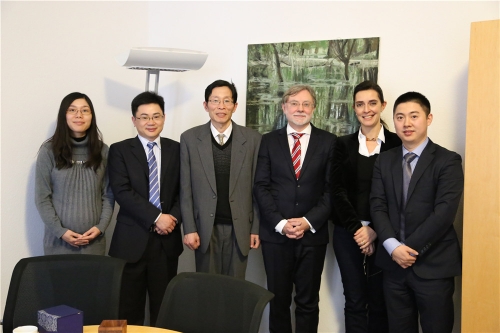
Reporters: Zhuhao Wang, Yuanhang Liang, Yanni Huang, Shan Cong, Miao Liu, Kun Zhang
Max Planck Institute for Foreign and International Criminal Law, news report:
https://www.mpicc.de/en/aktuelles/veranstaltungen/archiv/bilder/sino_germ_seminar_2016.html